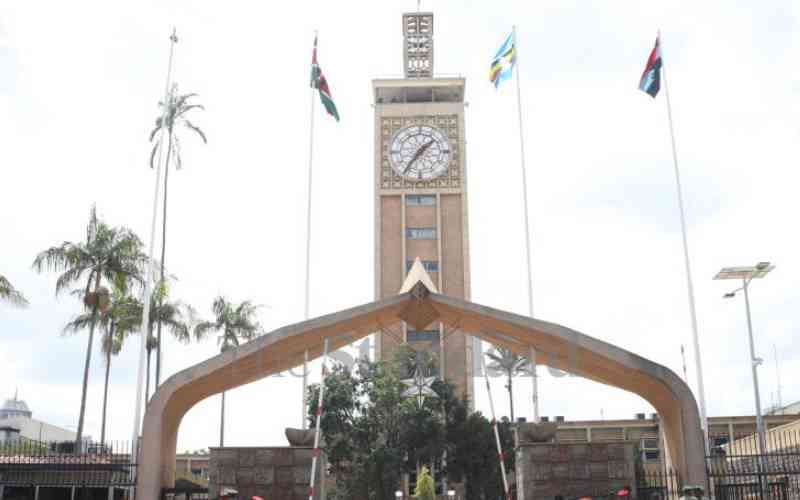Today’s discourse starts with a hypothetical question. In the unlikely event terrorists laid siege to Parliament moments after speaker Justin Muturi calls the House to order, what would go through his mind?
A lot would depend on his constitution, but he is human. Panic comes first. The next impulse is to seek cover from where it logically follows that one fervently prays for help. Help from men who, being human, also experience fear but have long since come to terms with their conscience, having willingly chosen the country with all the saints and heathens in it over self; soldiers.
In such a scenario, bowels can easily void. There is absolutely no dignity where bullets and shrapnel are flying like confetti; where contact with any of them could mean a life hereafter. Here too, the mind assumes super clarity.
It’s easy to suddenly discover that the spouse one has taken for granted is such a lovely person. It is possible to think about children and family and all those things one could have done for them. Fear does strange things.
Now, if Mr Muturi found himself (God forbid), starring down the muzzle of a gun pointing at his head, wouldn’t these things go through his mind? Probably, and yes, that is what soldiers experience. Unlike leaders especially, soldiers are selfless. They are patriotic Kenyans ready to lay down their lives for their country. Some went to Somalia where they knew they could die. They have dependants who would not have willingly allowed then to go to Somalia if they had an alternative.
These dependants are also alert to the dangers, and it hurts to think of the stress they endure. Nothing can mitigate that stress more than concern and kindness. A number of Kenyan soldiers have died in Somalia and Northern Kenya so that individuals like me can find the peace to grouse on this space.
Many have died so that Mr Muturi can live in peace and be referred to as ‘honourable speaker’ while he also enjoys special privileges that come with the job.
Last week, National Assembly Speaker Justin Muturi is reported to have declined a motion that would have ensured families of KDF soldiers who died in action were paid Sh20 million (earnable in a soldier’s lifetime) and their children given free education up to college. Mr Muturi’s reason for rejecting the motion was that it would have financial implications. This beats reason. I have some questions for Mr Muturi; has he considered the psychological and emotional implications of his position and those that arise from the finality of death to the victims’ families?
Has he, as the National Assembly speaker considered the financial implications of scams like the Eurobond and the National Youth Service among others? As the gate keeper, what action has he taken against such heists? On whose side is he; the bureaucrats or the people from whom he derives his mandate?
A country like America invests billions of dollars in military expenditure primarily to protect and take care of its soldiers. Those who die in battle abroad are taken back home as heroes. Their bodies are solemnly received by the Commander in Chief (the president) himself. Often, monuments are built in their honour.
The symbolism is enough to blunt the pain of relatives who are not left entirely wanting. Whatever budget is allocated to the military factors in the cost of war yet the country has never been to war.
What happens to that money? Is it too much to compensate families of soldiers who willingly walked into killing fields to defend Kenya’s sovereignty? We must give our soldiers reason to continue being patriotic.
They must never be demoralised knowing the chances they take when they can choose to lead an easy life are all in vain.
Canada has the Canadian Hero Fund through which the public is encouraged to help in raising money with only one aim; educate children of slain soldiers to the best of their abilities. In times of hardships Kenyans have shown unmatched compassion.
They overwhelm blood banks. They raise millions of shillings for victims in a couple of hours. The tragedy is that the leaders we elected are so vision-less, so lethargic they lack the energy to harness such potential.
If Kenya had visionary leaders, it could be miles away from the spot where it is today. Retired President Moi ran the country without foreign aid for many years yet the country did not experience the despondency we see nowadays despite all the Eurobond money, World Bank loans and other grants.
Stay informed. Subscribe to our newsletter
An average Kenyan today grapples with more problems than there were 10 years ago.
 The Standard Group Plc is a
multi-media organization with investments in media platforms spanning newspaper
print operations, television, radio broadcasting, digital and online services. The
Standard Group is recognized as a leading multi-media house in Kenya with a key
influence in matters of national and international interest.
The Standard Group Plc is a
multi-media organization with investments in media platforms spanning newspaper
print operations, television, radio broadcasting, digital and online services. The
Standard Group is recognized as a leading multi-media house in Kenya with a key
influence in matters of national and international interest.
 The Standard Group Plc is a
multi-media organization with investments in media platforms spanning newspaper
print operations, television, radio broadcasting, digital and online services. The
Standard Group is recognized as a leading multi-media house in Kenya with a key
influence in matters of national and international interest.
The Standard Group Plc is a
multi-media organization with investments in media platforms spanning newspaper
print operations, television, radio broadcasting, digital and online services. The
Standard Group is recognized as a leading multi-media house in Kenya with a key
influence in matters of national and international interest.








